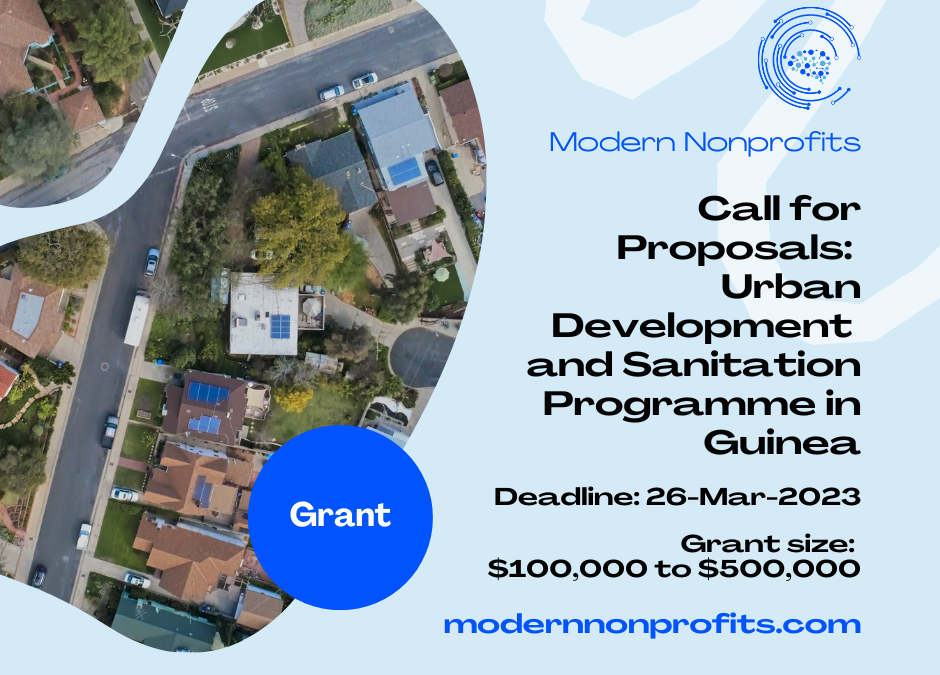Call for Proposals: Urban Development and Sanitation Programme in Guinea
Deadline Date: 26-Mar-2023
Donor Name: United Nations Human Settlements Programme (UN-Habitat)
Grant Size: $100,000 to $500,000
Category: Grant
Focus Countries: Guinea
More Info
In order to contribute significantly to the improvement of urban governance and the living environment of the population in Guinean cities, the European Union is financing the “Urban Development and Sanitation Programme in Guinea” (SANITA) within the framework of the 11th EDF, in collaboration with the Government through the Ministry of Urban Planning, Housing and Land Management (MUHAT).
Implemented by the United Nations Human Settlements Programme (UN-Habitat), the first of the two components of this programme, called the SANITA Sustainable Cities Project, aims at strengthening urban governance at local and national levels.
Funding Information
- The maximum budget for the implementation of the pilot projects is USD 270,000.
Projects
It is in the perspective of implementing result 5 of the SANITA Sustainable Cities Project that a collaboration with one or more local NGO(s) is sought, in order to ensure the implementation of (09) pilot projects aimed at improving the living environment in nine districts of Greater Conakry. The partner NGO(s) will have to favour an ecological, responsible and inclusive approach. Applicant NGOs will be able to make their technical and financial proposals:
- For all projects; or
- By batches of projects, i.e. for a selection of projects among the nine pilot projects presented, according to their implementation capacity and their geographical area of experience.
To this end, three essential components are recommended for the effective implementation of these projects.
These include:
- Coordination, supervision and quality control monitoring of the construction companies on the sites concerned, and the locally recruited workforce;
- Supporting community mobilisation; facilitating the involvement of young people, women and people living with disabilities during the implementation of pilot projects;
- Regular monitoring of the project implementation process.
Applicant organizations must be willing to commit to UN-Habitat and be able to provide additional resources (human resources, knowledge, funds, in-kind contributions, supplies and/or equipment) to achieve the common objectives of the selected projects, as described and subsequently agreed upon in a cooperation agreement. All drawings and technical sheets as well as detailed budget lines for each of the projects concerned will be provided to the selected NGOs.
Specifically, for this support, planned activities include, but are not limited to, the following key elements:
- Recruitment, coordination and supervision of construction companies and local labour for the different phases of construction (or direct implementation if capacity exists); including any necessary procurement of materials;
- Accompany the different stages of construction of community structures, as defined in the project documents, in consultation with the UN-Habitat technical team;
- Inform beneficiary communities of the objectives, content and progress throughout the implementation process;
- Raising community awareness about sanitation, women’s inclusion and participation, and promote development of local skills and know-how;
- Ensure the involvement of local youth and women in the construction phases of the structures, with a view to encouraging their social and economic empowerment;
- Monitoring and evaluation of projects.
Outcomes
The challenge of preventing and reducing slums in the cities cannot be met without the direct involvement of the vulnerable populations concerned (young people, women, people living with disabilities in particular) in the identification, design and implementation phases of priority pilot projects as defined in the five outcomes detailed below:
- Result 1 (R1): Institutional capacities for the implementation and monitoring of framework documents are strengthened;
- Result 2 (R2): A national urban policy defining the strategic orientations, roles and responsibilities of the different actors is developed and validated;
- Result 3 (R3): The implementation of the 1991 National Land Use Plan (SNAT) is evaluated and new strategic orientations (white paper) are defined and validated;
- Result 4 (R4): Urban planning documents for the capital city, with appropriate action plans that take into account climate change aspects, are developed and validated in a participatory manner;
- Result 5 (R5): Priority pilot projects are developed and implemented through the creation or strengthening of inclusive consultation spaces and multi-stakeholder dialogue.
For more information, visit UN-Habitat.


